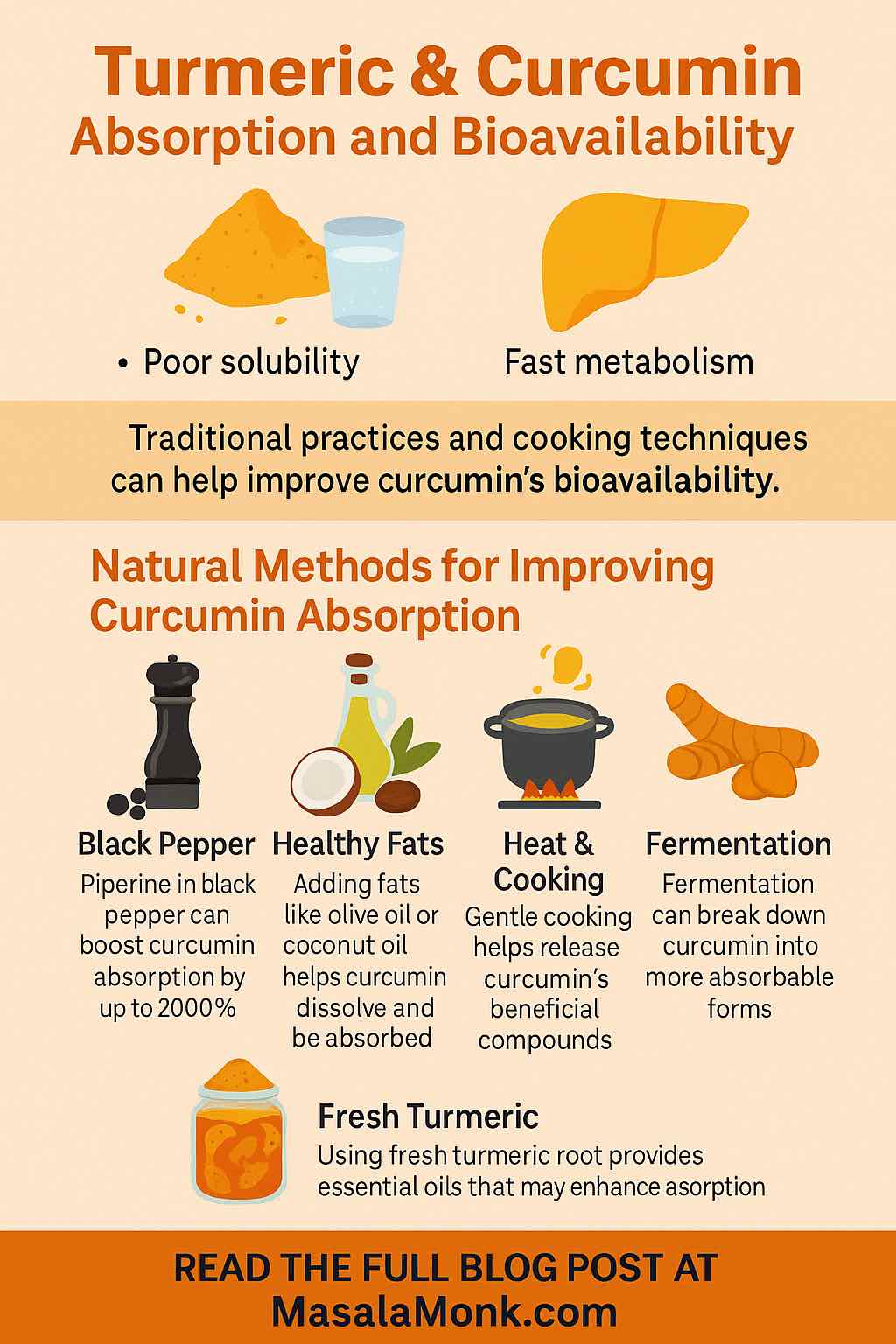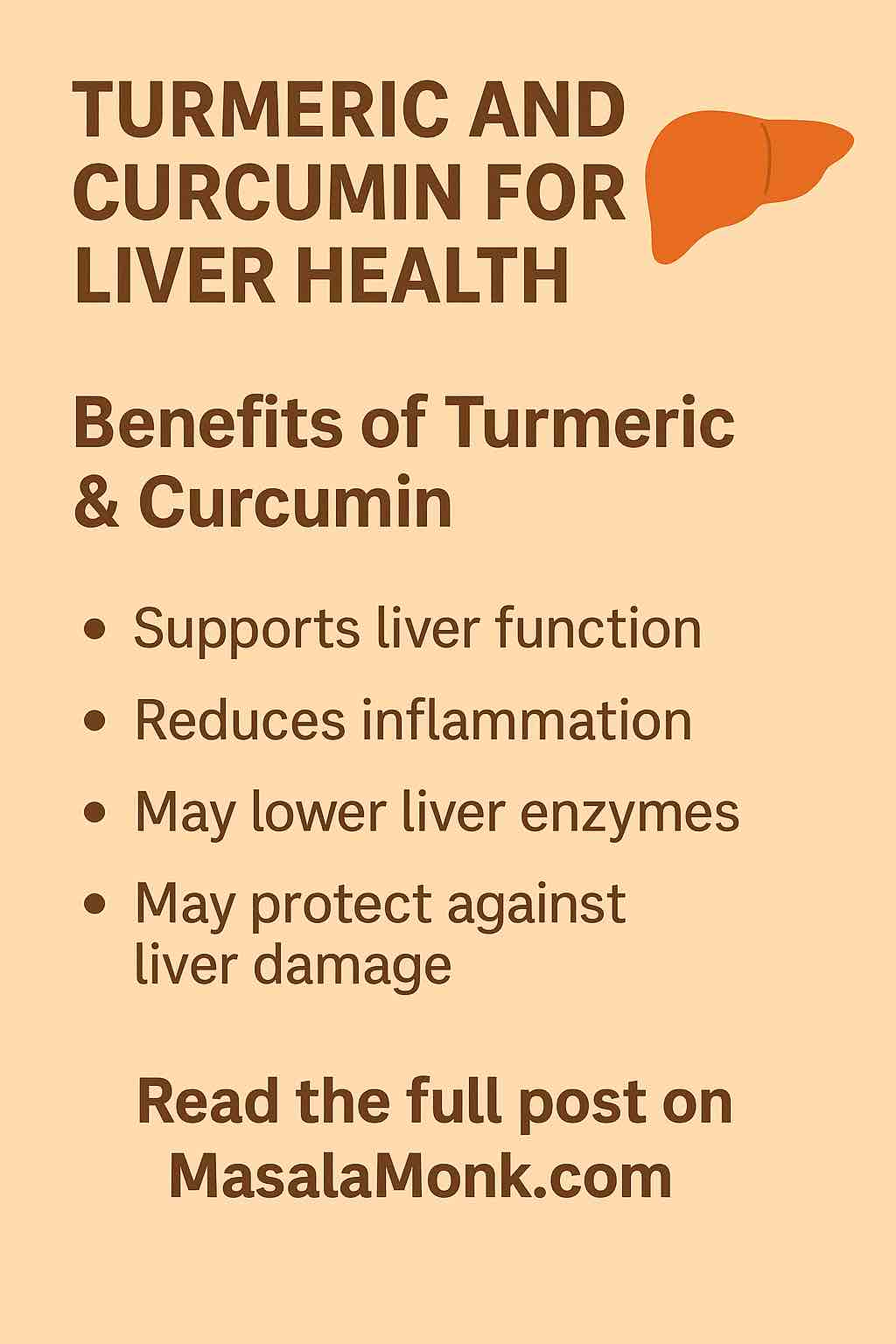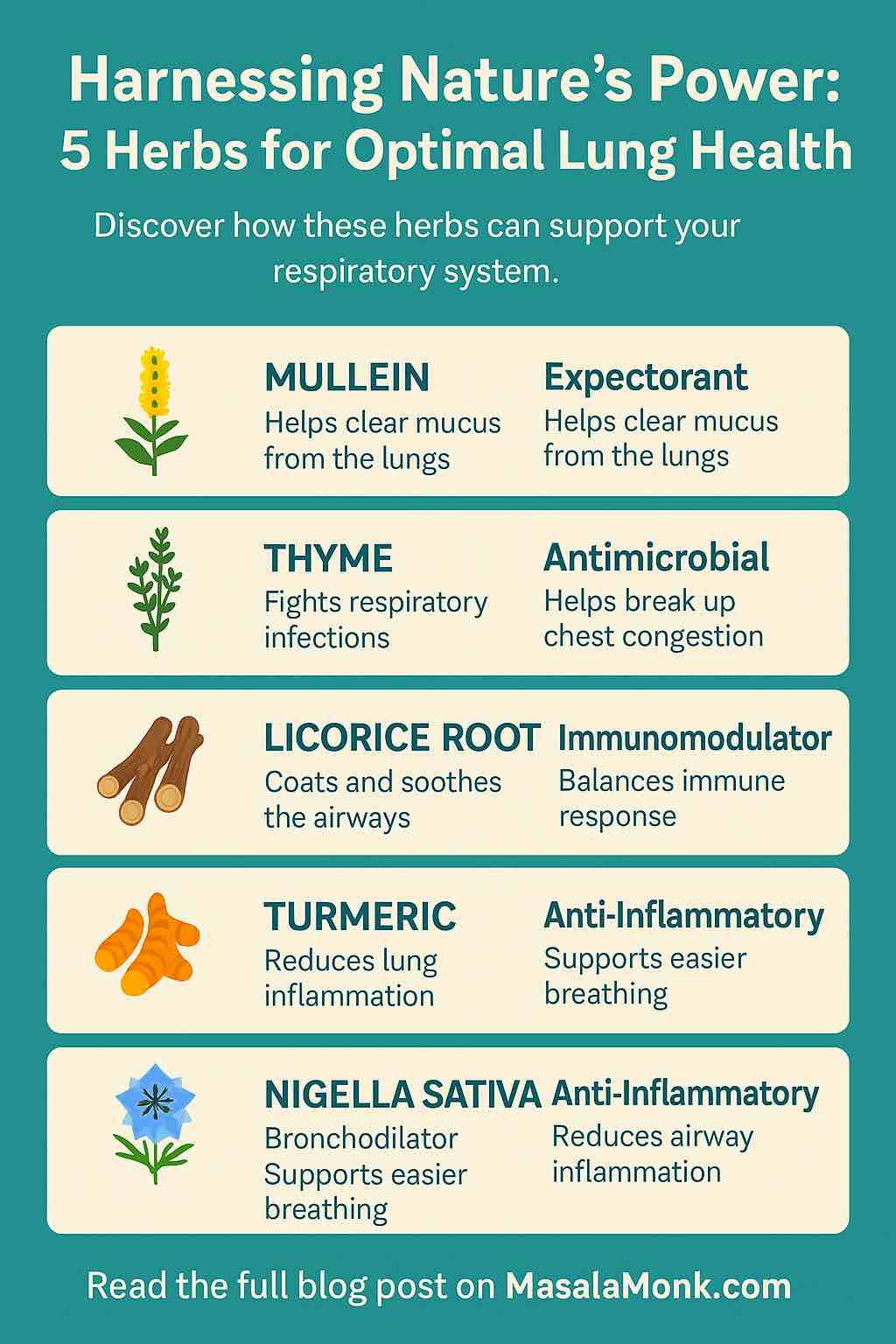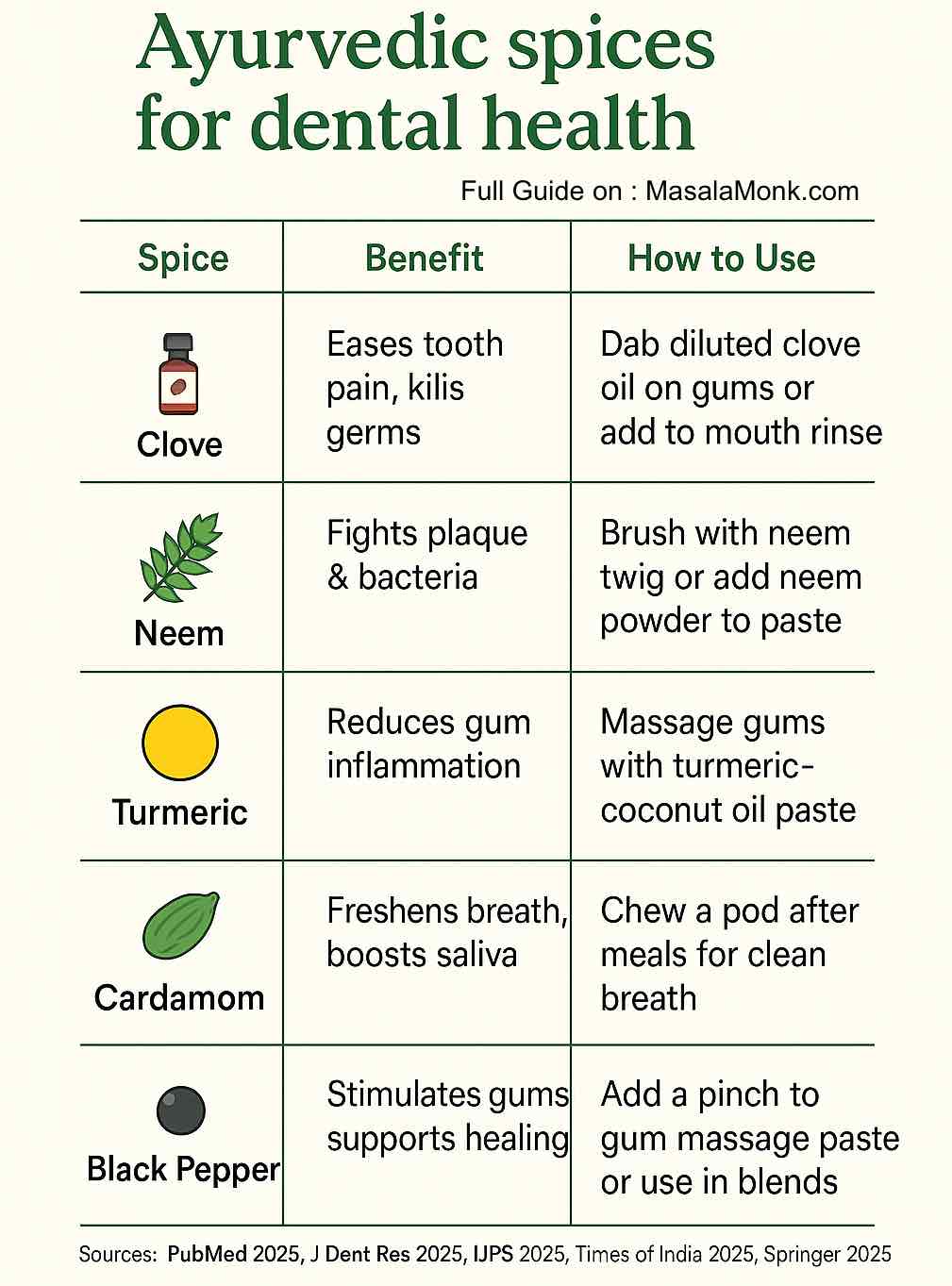
Why Turmeric & Curcumin Absorption and Bioavailability Matters? Turmeric has a way of making its presence known. Sprinkle it into a curry, and suddenly the dish glows with a golden hue. Stir it into warm milk, and you have a soothing bedtime drink that feels like comfort in a cup. For thousands of years, turmeric has been celebrated in Ayurvedic and traditional medicine for its healing properties—especially in Indian cuisine, where food and medicine often overlap.
At the heart of turmeric’s magic lies curcumin, the active compound credited with many of its health benefits—from easing inflammation to supporting digestion and protecting against oxidative stress. But there’s one big challenge: turmeric & curcumin absorption and bioavailability are naturally very low.
That means that even if you’re adding turmeric to your smoothies, teas, or golden lattes every day, your body may not be absorbing much of the curcumin at all. The good news? With the right food pairings, cooking techniques, and daily practices, you can dramatically improve how much curcumin your body actually uses.
Why Bioavailability of Turmeric or Curcumin Matters?
Before we dive into the how, let’s take a step back and talk about the what. Bioavailability is just a fancy word that means how much of a substance actually makes it into your bloodstream and becomes usable by the body.
Now, here’s the tricky part with curcumin. Its challenges come down to two main issues:
- Poor solubility – Curcumin doesn’t dissolve well in water, which means it struggles to move through the body.
- Fast metabolism – Even when some curcumin does make it in, the liver breaks it down so quickly that it leaves the body before it can do its job.
Because of these two hurdles, the body absorbs less than 1% of curcumin from plain turmeric powder. Yes, you read that right—less than one percent. That’s why scientists, traditional healers, and even food lovers across cultures have spent centuries exploring creative ways to improve turmeric absorption and bioavailability.
It’s also why it’s important to be mindful of dosage, as highlighted in our guide on the serious side effects of turmeric.
Ancient Wisdom Meets Modern Science
Here’s where things get really fascinating. Many of the solutions modern researchers point to today were already being used in kitchens and healing practices hundreds of years ago. In other words, what science is confirming now, tradition already knew instinctively.
Take Indian cooking, for example. Turmeric is almost always combined with oil or ghee, which makes sense once you realize that curcumin is fat-soluble. This simple pairing instantly boosts its absorption.
Then there’s Ayurveda, where recipes often call for turmeric mixed with black pepper. Only recently have we learned that black pepper contains piperine, a compound that can increase curcumin absorption by up to 2000%—something we’ve explained in detail in our article on the health benefits of turmeric with black pepper.
And let’s not forget golden milk, that comforting drink made by simmering turmeric in warm milk with spices. Without anyone putting it in scientific terms, this tradition combined fat, pepper, and heat—the three exact factors we now know are critical for better curcumin bioavailability. For a step-by-step guide, you can explore the right way of consuming turmeric milk.
So while researchers may use words like “synergistic effects” and “enhanced solubility,” the truth is simple: traditional methods weren’t just flavorful, they were brilliantly functional.
Natural Ways to Improve Turmeric & Curcumin Absorption and Bioavailability
1. Black Pepper and Turmeric Absorption
One of the simplest, most powerful ways to boost curcumin absorption is adding black pepper. Its active compound, piperine, slows the breakdown of curcumin in the liver.
Studies show that pairing turmeric with piperine can increase absorption by up to 2000%. That’s an incredible boost from something as simple as a dash of pepper.
💡 Practical Tip: If you’re making a turmeric latte, curry, or even sprinkling turmeric into soups, always add a little freshly cracked black pepper.
2. Curcumin Absorption with Healthy Fats
Curcumin is fat-soluble, which means it needs fats or oils to dissolve and move into your bloodstream. That’s why adding turmeric to water alone won’t do much.
- Cooking with olive oil, coconut oil, or ghee allows curcumin to bind with fats.
- Traditional dishes like curries naturally combine turmeric with fat, boosting its bioavailability.
- Even turmeric tea becomes more effective if you stir in a spoon of coconut oil or drink it with milk.
💡 Practical Tip: Make a simple salad dressing with olive oil, turmeric, black pepper, and lemon juice—delicious and absorbable.
3. Heat and Cooking for Better Turmeric Bioavailability
Gentle cooking can help activate turmeric’s compounds. While prolonged high heat can destroy curcumin, light cooking—like simmering turmeric in soups, sautés, or golden milk—helps release its beneficial properties.
💡 Practical Tip: Add turmeric towards the middle of cooking, not right at the beginning where it might overheat, or at the very end where it may not blend with fats and spices.
4. Fermentation for Curcumin Absorption from Turmeric
Emerging research suggests that fermentation may increase curcumin bioavailability. Traditional practices like making turmeric pickles or fermenting turmeric in tonics (common in some Southeast Asian traditions) may improve absorption because the fermentation process breaks compounds down into more usable forms.
💡 Practical Tip: Try incorporating fermented turmeric drinks or chutneys if available, or experiment with adding grated turmeric root to homemade ferments.
5. Whole Root vs Powder: Which Form Has Better Absorption?
Both whole turmeric root and powdered turmeric have curcumin, but their absorption depends on preparation. Fresh turmeric root contains essential oils that may help enhance absorption compared to dry powder.
💡 Practical Tip: Rotate between fresh turmeric root (in teas, juices, or grated into dishes) and powdered turmeric for variety and a broader nutrient profile.
Everyday Ways to Support Turmeric & Curcumin Absorption and Bioavailability
Turmeric doesn’t have to sit quietly in your spice rack, waiting for the occasional curry night. When you understand the principles of turmeric & curcumin absorption and bioavailability, you can weave it into your daily life in simple, enjoyable ways. The best part? These methods don’t feel like “health hacks” at all—they’re cozy, tasty rituals that naturally boost curcumin’s effectiveness.
✨ Golden Milk at Night
There’s something soothing about a warm cup before bed, and golden milk is a classic for good reason. Simply stir turmeric into warm milk—whether dairy or plant-based—then add a pinch of black pepper and a drizzle of honey. The fat in the milk helps curcumin absorb, while the pepper supercharges its bioavailability. Plus, it feels like a hug in a mug. For more details, check our guide on turmeric milk.
🥤 Morning Smoothie Boost
If you’re more of a smoothie person, turmeric can slide right into your morning routine. Blend fresh turmeric root with banana, coconut oil, and just a sprinkle of black pepper. The fruit adds sweetness, the oil supports absorption, and the pepper ensures you’re not wasting curcumin’s potential. It’s bright, energizing, and a perfect start to the day. This routine also links closely to metabolism, as explored in our article on turmeric for belly fat reduction.
🥄 Homemade Turmeric Paste
For those who love versatility, a jar of turmeric paste in the fridge is a game-changer. Combine turmeric, black pepper, and coconut oil into a smooth base. Then, whenever you’re cooking, you can stir a spoonful into soups, teas, or even a quick latte. It’s an easy way to add a consistent dose of curcumin without having to think too hard.
🍯 Turmeric Honey
Here’s a sweet little trick: mix turmeric powder into raw honey with a dash of black pepper. Keep it in a jar and take a spoonful daily, or stir it into warm water or tea. Not only does it taste wonderful, but it’s also one of the simplest ways to improve turmeric bioavailability without changing your diet drastically.
🥘 Cooking Staples
Of course, one of the easiest ways to benefit from turmeric is simply to cook with it. Add it to rice, lentils, roasted veggies, or soups. Just remember the golden rule: pair turmeric with fat and pepper. A drizzle of olive oil, a pat of ghee, or a sprinkle of cracked pepper can make the difference between wasted curcumin and fully absorbed goodness.
Modern Research Meets Daily Rituals
Now, scientists are busy working on cutting-edge solutions like liposomal curcumin, phytosome formulations, and nanoparticle delivery systems. These high-tech methods may have their place, but here’s the truth: you don’t necessarily need them to reap the benefits of turmeric.
Because while researchers test new delivery systems in the lab, the everyday kitchen practices that have been around for centuries—pairing turmeric with black pepper, fat, and gentle heat—remain some of the most effective and practical ways to improve turmeric & curcumin absorption and bioavailability.
And that’s where the beauty lies. You can unlock the golden spice’s full potential not by searching for exotic pills or powders, but by leaning into both ancient wisdom and modern understanding—right in your own kitchen.
If you’re curious how these strategies tie into daily health goals, our piece on turmeric curcumin for weight loss explores the connection.
Conclusion: Improving absorption and bioavailability of Turmeric for You
Turmeric is a golden gift from nature, but it only shines fully when we pay attention to absorption and bioavailability. On its own, curcumin passes through the body quickly. But with the right partners—black pepper, fats, gentle heat, and even fermentation—its power is unlocked.
If you want turmeric to truly support your health, don’t just take it—take it wisely. Sprinkle it with pepper, stir it into oils, cook it with care, and let it become a natural rhythm in your daily meals. For more creative ideas, you can also explore our post on turmeric and apple cider vinegar for wellness.
That way, turmeric & curcumin absorption and bioavailability stop being obstacles and instead become the gateway to reaping the golden spice’s full benefits.
Related Posts You Might Enjoy
If you found this guide on turmeric & curcumin absorption and bioavailability helpful, you might also enjoy these posts from our wellness library:
- 🧘 Is Turmeric Good for Your Liver? What the Latest Research Really Says – explore turmeric’s benefits and safety, especially when it comes to liver health.
- 🍵 Know the Right Way of Consuming Turmeric Milk – discover how this comforting drink can become a powerful daily ritual.
- 🌿 Harnessing the Power of Turmeric for Belly Fat Reduction – learn how turmeric can support metabolism and weight goals.
- 🌶️ Health Benefits of Turmeric with Black Pepper – see why this spice duo is more than flavor—it’s functional medicine on your plate.
- 🍯 Turmeric and Apple Cider Vinegar for Weight Loss & Wellness – creative ways to pair turmeric with ACV for daily wellness routines.
FAQs on Turmeric & Curcumin Absorption and Bioavailability
1. Why is turmeric & curcumin absorption so low?
Turmeric contains curcumin, its most active compound, but curcumin is tricky. It doesn’t dissolve well in water, and the liver breaks it down too quickly. As a result, less than 1% of curcumin from plain turmeric powder makes it into the bloodstream. That’s why people focus so much on turmeric bioavailability and finding the best absorbed turmeric methods.
2. What is the best way for the body to absorb turmeric?
The best way to absorb turmeric naturally is by pairing it with black pepper and healthy fats. Black pepper contains piperine, which slows curcumin’s breakdown, while fats help it dissolve and pass through cell membranes. That’s why golden milk, turmeric curries, and smoothies with coconut oil are all excellent choices.
3. Does black pepper really help turmeric absorption?
Yes, and it’s one of the simplest methods available. Black pepper’s compound piperine can boost curcumin absorption in the body by up to 2000%. This is why supplements often advertise “turmeric with Bioperine.” But you don’t need to buy a pill—just add freshly ground pepper to your turmeric dishes, lattes, or teas.
4. Is turmeric powder enough, or do I need supplements?
Turmeric powder on its own has very low absorption, but when combined with black pepper, fats, or gentle cooking, its bioavailability improves naturally. Supplements such as “high absorption curcumin” exist, but you can achieve many of the same benefits through smart kitchen practices.
5. What foods or drinks increase turmeric absorption?
Everyday recipes can do wonders for turmeric absorption and bioavailability:
- Golden milk with turmeric, pepper, and milk (dairy or plant-based).
- Smoothies with fresh turmeric, banana, coconut oil, and pepper.
- Curries or stir-fries cooked in olive oil or ghee.
- Turmeric honey mixed with pepper.
In short, pair turmeric with fat, heat, and pepper to unlock the best results.
6. Which form of turmeric has the best absorption?
Neither fresh root nor powder wins automatically. Fresh turmeric has essential oils that support absorption, while powder is more versatile. The real key is how you use them. Whether fresh or powdered, pairing with pepper and fats ensures you’re getting the best absorbed turmeric possible.
7. Can I take turmeric on an empty stomach?
You can, but it’s not ideal. Because curcumin is fat-soluble, it absorbs much better when consumed with food that contains oils or fats. For maximum turmeric & curcumin absorption and bioavailability, try taking it with a meal instead of on an empty stomach.
8. Does turmeric water work for curcumin bioavailability?
Turmeric water may look pretty and feel cleansing, but unfortunately, it doesn’t do much for curcumin absorption. Since curcumin doesn’t dissolve in water, your body can’t make use of much of it this way. Adding black pepper and a little healthy fat—like coconut oil—turns plain turmeric water into a more effective tonic.
9. How much turmeric should I take daily for better absorption?
There isn’t a one-size-fits-all dose, but research often uses 500–2000 mg of curcumin extract per day. For kitchen use, adding ½–1 teaspoon of turmeric powder daily (always paired with pepper and fat) is a safe and practical habit. If you’re considering higher doses, talk to a healthcare professional first.
10. Can turmeric replace medication if absorption is improved?
Turmeric is a powerful spice, but it’s not a substitute for prescribed medication. Even with improved curcumin bioavailability, it should be seen as a supportive addition to a healthy lifestyle rather than a replacement for medical treatment. Always consult your doctor before making changes to your healthcare plan.
Further Reading on Turmeric & Curcumin Absorption and Bioavailability
If you’d like to go even deeper into the science and traditions behind turmeric & curcumin absorption and bioavailability, here are some trusted resources worth exploring. Linking to high-quality sources not only builds credibility but also shows how both ancient wisdom and modern research agree on turmeric’s potential.
- 🌱 Johns Hopkins Medicine – Turmeric Benefits
A clear overview of turmeric’s health benefits, including how black pepper improves curcumin bioavailability by up to 2000%.
👉 Read more at Johns Hopkins Medicine - 🧪 NutritionFacts.org – Boosting Curcumin Absorption
Dr. Michael Greger explains how dietary strategies like combining turmeric with piperine and fats can dramatically increase absorption.
👉 Watch the video and article on NutritionFacts.org - 🍛 Seven Seas – Why Everyone is Talking About Turmeric
A practical look at how traditional Indian cooking practices—like frying turmeric in ghee—were already designed to enhance turmeric bioavailability.
👉 Explore more on Seven Seas UK - 📖 NIH – Curcumin: A Review of Its Effects
A scientific review discussing why curcumin has poor solubility and absorption and how researchers are working on new delivery methods like nanoparticles and liposomes.
👉 Read the full review on PubMed Central - 🧘 Harvard Health – A Look at Turmeric’s Benefits
A balanced article that connects turmeric’s traditional uses with current research into high absorption curcumin and its potential role in modern health.
👉 Check it out on Harvard Health
Why These Links Matter
By reading further, you’ll see how both science and tradition point to the same conclusion: turmeric works best when its absorption and bioavailability are supported. Whether through black pepper, healthy fats, or cooking techniques, the golden spice delivers more when we give it the right partners.













